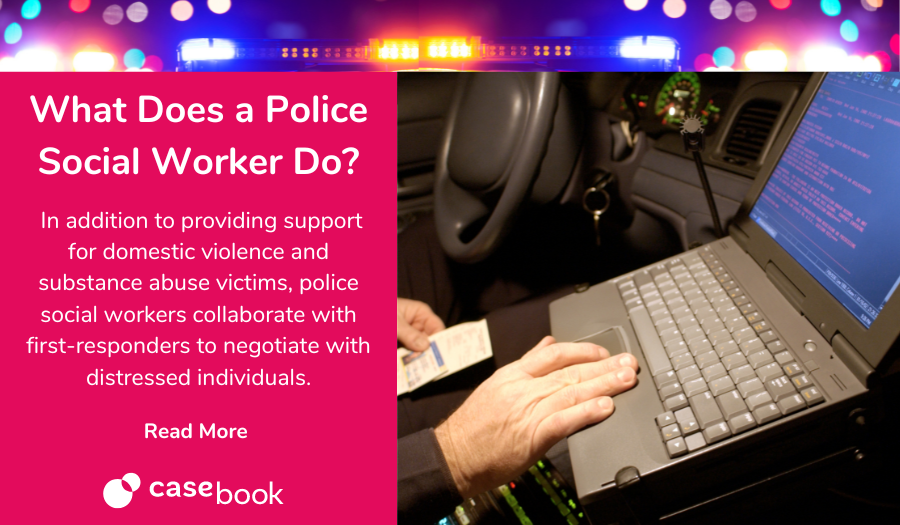Counseling and Crisis Response Support
Police social workers complement the efforts of law enforcement officers, expanding the services provided by local police and sheriff’s departments. According to ZipRecruiter, they “provide counseling and crisis response support for community members who are referred by police officers.” They can be employed by various law enforcement organizations or by social service agencies that partner with law enforcement.
Crisis social work is often challenging and risky, although it’s valuable and potentially very rewarding as well. In addition to providing support for domestic violence and substance abuse victims, police social workers collaborate with first-responders to negotiate with distressed individuals. They counsel those who are grieving for lost loved ones and develop programs for at-risk youth. To facilitate their own efforts, they also provide counseling to police officers and their families, as well as training programs to address:
- Stress management
- Mental illness
- Substance abuse
- Domestic violence
- Child abuse
Someone To Talk To
Police social workers provide vital long-term contacts to crime victims, people suffering from mental illness, and those who struggle with substance abuse or homelessness. But the job isn’t always so grave.
There are times when people simply want to be heard by an empathetic listener. “Sometimes, it’s just a friendly ear,” said Emily Constantino of the Willimantic Police Department in Connecticut, a participant in the Social Work and Law Enforcement (SWLE) Project.
A partnership between Eastern Connecticut State University’s Social Work Program and the Willimantic Police Department gave rise to the SWLE Project. Among the goals of the project are to:
- “Bridge the divide between community and police”
- “Address mental health needs”
- “Use research, training, supervision, and consulting to support social work and law enforcement partnerships”
- “Employ evidence-based interventions, evaluate practice, and advocate for policy implementation”
What Police Social Workers Do Within the Big Picture
Under many circumstances, it can take a sizable team of dedicated professionals to deliver the care a person may need. The existence of police social workers does not lessen the need for other social workers, nor does the advancement of technology reduce the importance of advocacy, empathy, or human contact in social work.
People, process, and technology must together form a unified response to adequately address the problems that many individuals face today. What a police social worker does is use the tools they have to assist others in need. To provide high-quality client experiences as a social worker, the level of collaboration required of you and your team calls for a cloud-native, mobile software solution that’s scalable and configurable to the needs of your organization and its unique mission.
The benefits of having an accessible, intuitive software platform that automates your workflows, streamlines communication, and cuts paper out of the process are manifold. Though new, cloud technology has managed to have a considerable influence on what a police social worker does. The gains in efficiency, security, and collaborative capabilities that cloud-based platforms can provide are changing how social work is performed.
Whether providing counseling or crisis response support, negotiating with individuals in distress, or training the police officers they work with in various aspects of social work, this relatively new type of social worker serves to complement the role of law enforcement officers in low-risk situations. Although challenging, police social work can be highly rewarding. Working as part of a team and adopting new technological tools to enhance client experiences, you can make an immeasurable difference as a police social worker.



